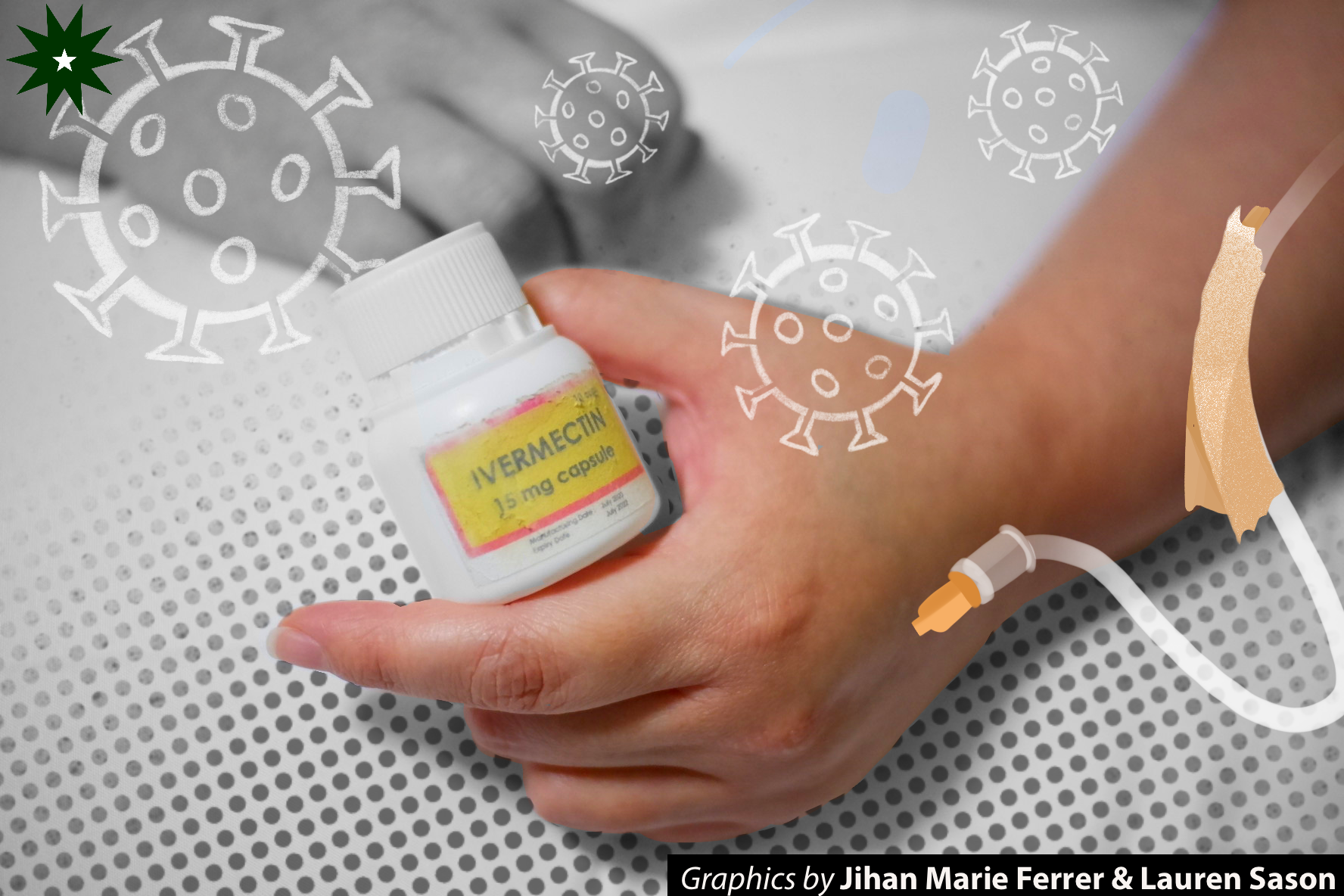It has been over a year since COVID-19 brought the world to a halt in March 2020. It is unsurprising, then, that people are desperate for the pandemic to be over. Some go as far as taking drugs not indicated for use against COVID-19, and sometimes in forms not meant for human consumption.
An example of such a drug is ivermectin—an anti-parasitic typically used to treat worm infestations or lice in humans and animals. The drug has recently gained traction as a supposed “cure” or “preventive measure” against COVID-19. Clamor for its use was heightened earlier this year despite repeated warnings from the United States (US) Food and Drug Administration (FDA) and the Philippine Health Department who strongly oppose the use of the drug to treat COVID-19 outside of clinical trials. The Philippine FDA, on the other hand, granted compassionate special permits for the use of ivermectin to three hospitals last April. Months later, the agency has approved the use of ivermectin only within clinical trials.
However, with the public touting ivermectin’s effectiveness against the virus, might there be any merit to these claims?

Worth considering?
While ivermectin takes the spotlight for being a popular “treatment” for COVID-19, Dr. Deo L. Panganiban, chair of the Department of Pharmacology at De La Salle Medical Health Sciences Institute’s College of Medicine, highlights other drugs such as remdesivir and tocilizumab, which have proven antiviral and anti-inflammatory properties against COVID-19.
According to Panganiban, remdesivir prevents the replication of SARS-CoV-2 by incorporating itself into the RNA strands that form the virus. In particular, a double-blind, randomized, placebo-controlled trial conducted by Dr. John H. Beigel and his colleagues from November 2020 showed that COVID-19 patients who took remdesivir were observed to recover faster by ten days as opposed to the 15-day recovery period of the placebo-induced trials and have reduced severity of respiratory tract infections.
As for tocilizumab, Panganiban states that it has the ability to stop what is known as a “cytokine storm”—a severe immune reaction wherein inflammatory cells enter the lungs and their air sacs. An article by Binqing Fu and company highlights the drug’s noteworthiness as a treatment for COVID-19 since the virus is capable of causing mucus buildup in the lungs, a potential source of inflammation.
What differentiates ivermectin from these drugs is its use as an antiparasitic. Panganiban highlights that a study on the use of ivermectin against COVID-19 was conducted back in April. “They used very high doses of ivermectin which prevented the replication of the SARS-CoV-2,” he explains. However, he notes that the study “did not use ivermectin on humans or animals”, instead being conducted inside test tubes.
Dr. Faye Cagayan, a practicing obstetrician and faculty of the University of the Philippines Manila College of Medicine’s Department of Pharmacology and Toxicology, adds that ivermectin does possess a level of usefulness in terms of antiviral activity. The drug’s main mechanism of action is through blocking the transporters possessed by viral proteins.
She explains that a large portion of the efforts being put into discovering a drug that is effective against SARS-CoV-2 involves the “repurposing [of] available agents,” or simply using already discovered drugs in an attempt to alleviate the symptoms of the virus.
Despite all the hearsay about ivermectin’s supposed effectiveness against the virus, however, both Panganiban and Cagayan are firm in their stance that currently, there is not enough evidence to support the claims being touted online.
“I follow the same conclusions that the FDA, US FDA, WHO, and even our own local societies have made when it comes to ivermectin—there is not enough evidence showing its efficacy—the maximum response a drug has against the ailment—against COVID-19,” Cagayan espouses.
‘Prevention’ at what cost?
Regarding reports on the use of ivermectin as prophylaxis or a preventive measure against COVID-19, Panganiban divulges that the drug also has its own side effects. These include fatigue, dizziness, nausea, vomiting, abdominal pain, and rashes when used for the treatment of lice or other external parasites.
He also mentions that long-term effects have also been observed such as hypotension, skin rashes, and in serious cases, seizures. Reports of these side effects are common for onchocerciasis, or river blindness—an illness caused by parasitic worm Oncoserca volvulus, where long-term treatment is necessary.
However, in the case of COVID-19 where the dosage is unregulated, Cagayan cites this as an area of worry. These side effects can be even more problematic when comorbidities are factored in. She warns, “Ivermectin can actually exacerbate or worsen your condition.”
She adds that patients who have damaged livers and kidneys due to severe cases of COVID-19 will experience an even higher likelihood of developing adverse reactions to ivermectin. Citing reports from the Philippine General Hospital’s Toxicology unit, she says, “Meron tayong reported incidents of seizures and renal and liver failure…due to ivermectin.”
Continuing the conversation
Medical experts strongly advise the public to be wary of illegitimate reports regarding COVID-19 treatments circulating on social media. Panganiban avers that “factual information must be spread through our agencies or non-governmental agencies that have proven themselves to be guardians of public health, case in point, the World Health Organization, the US Centers for Disease Control and Prevention, and the US FDA”.
While health agencies are at the forefront of COVID-19 developments, it is also important to take note that science communication plays a vital role in spreading factual information. Cagayan adds, “We just need to continue what needs to be done and look at the evidence and direct the readers to the proper sources”.
Repurposing of drugs has long been practiced in pharmacology to find alternative treatments for infections even before COVID-19. Although ivermectin has shown some promise in pre-clinical trials and laboratory examinations, further studies must be conducted before repurposing the drug as a treatment for COVID-19.
